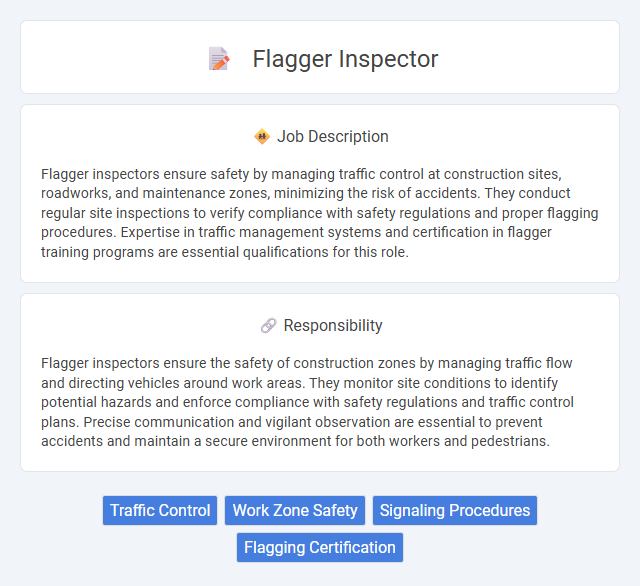
Flagger inspectors ensure safety by managing traffic control at construction sites, roadworks, and maintenance zones, minimizing the risk of accidents. They conduct regular site inspections to verify compliance with safety regulations and proper flagging procedures. Expertise in traffic management systems and certification in flagger training programs are essential qualifications for this role.
Flagger inspector roles likely suit individuals with strong attention to detail and the ability to maintain focus in potentially hazardous environments. Those who are calm under pressure and possess effective communication skills probably find success in managing traffic and ensuring safety compliance. People with limited physical stamina or difficulty concentrating outdoors may be less suitable for this demanding position.
Qualification
Flagger inspectors require a high school diploma or equivalent, with specialized training in traffic control and safety regulations. Certification from recognized institutions like Work Zone Safety or OSHA enhances job prospects and ensures compliance with legal standards. Strong communication skills and the ability to interpret site plans and regulatory guidelines are essential for effective hazard identification and traffic management.
Responsibility
Flagger inspectors ensure the safety of construction zones by managing traffic flow and directing vehicles around work areas. They monitor site conditions to identify potential hazards and enforce compliance with safety regulations and traffic control plans. Precise communication and vigilant observation are essential to prevent accidents and maintain a secure environment for both workers and pedestrians.
Benefit
A Flagger Inspector position likely offers significant safety benefits by ensuring proper traffic control and reducing accident risks at construction sites. The role may also improve job site efficiency by maintaining clear and consistent signaling protocols. Candidates can expect to gain valuable skills in traffic management, enhancing their career prospects within construction and public safety fields.
Challenge
Flagger inspector roles likely involve significant challenges related to maintaining safety and ensuring compliance on busy construction sites. The probability of encountering high-pressure situations requiring quick decision-making to manage traffic flow and protect workers is considerable. Effective communication and vigilance probably play crucial roles in overcoming these operational difficulties.
Career Advancement
A Flagger Inspector oversees traffic control operations, ensuring compliance with safety regulations and minimizing hazards on job sites. Mastery in this role provides a strong foundation for career advancement into positions such as Traffic Control Supervisor or Safety Officer, where leadership and regulatory expertise are essential. Continuous skill development and obtaining certifications in traffic management can significantly enhance promotion opportunities in the construction and transportation industries.
Key Terms
Traffic Control
Flagger inspectors play a critical role in traffic control by ensuring construction zones and roadwork areas maintain safe and efficient vehicle flow. They monitor flaggers' performance, enforce compliance with safety regulations, and mitigate risks associated with traffic disruptions. Their work reduces accidents and optimizes traffic management during road maintenance and utility projects.
Work Zone Safety
Flagger inspectors play a critical role in maintaining work zone safety by monitoring traffic control measures and ensuring compliance with safety regulations. Their responsibilities include verifying proper signage placement, communicating with flaggers to manage vehicle flow, and identifying potential hazards to prevent accidents. Effective work zone safety managed by flagger inspectors reduces risks for both construction workers and drivers, promoting a secure environment on roadways.
Signaling Procedures
Flagger inspectors ensure strict adherence to signaling procedures to maintain safety and traffic flow on construction sites. They monitor the correct use of hand signals, flags, and signaling devices to guide motorists and pedestrians, minimizing hazards. Mastery of standardized signaling protocols is critical for preventing accidents and ensuring effective communication between flaggers and site personnel.
Flagging Certification
Flagger inspector jobs require thorough knowledge of traffic control principles and safety regulations to ensure safe work zones. Obtaining Flagging Certification validates an inspector's ability to manage traffic flow, understand signage requirements, and enforce safety standards on construction or maintenance sites. Certified flagger inspectors improve workplace safety by minimizing accidents and ensuring compliance with OSHA and MUTCD regulations.
 kuljobs.com
kuljobs.com